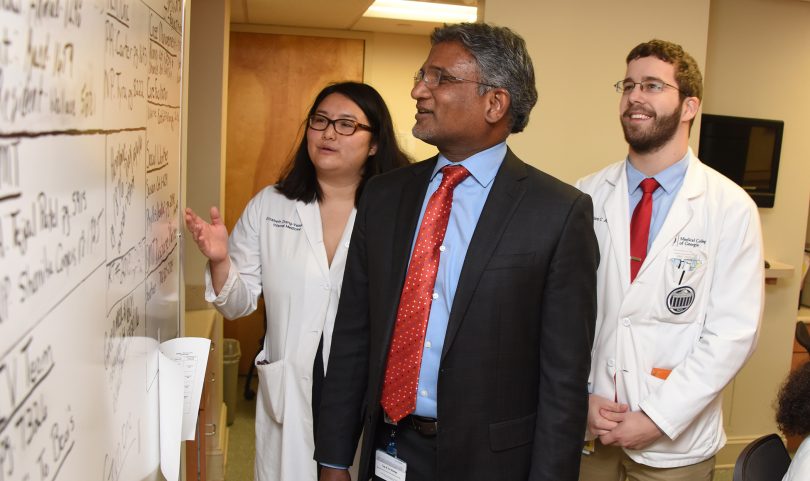“We are extremely grateful for Dr. Anand Jillella for helping to create the foundation for this organization,” said Georgia CORE president and CEO Lynn Durham. “We honor each of the Trailblazers for playing a pivotal role through research, education, or advocacy in creating and sustaining Georgia’s innovative, collaborative, and cancer patient-centered ecosystem.”
Jillella will be recognized at gala on February 18 in Atlanta. He serves as the J. Harold Harrison MD Chair for Medical Oncology at the Medical College of Georgia and Georgia Cancer Center. Jillella is the founding director of the Cancer Center’s adult stem cell and bone marrow transplant program and served as chief of the MCG Section of Hematology/Oncology from 2005-13, when he was named associate director for Community Affairs and Outreach at Winship Cancer Institute at Emory University. Jillella is a member of the Eastern Cooperative Oncology Group Myeloma and Leukemia Committees and the ECOG/ACRIN Advisory Board for National Cancer Institute Community Oncology Research Program centers. ECOG/ACRIN is a scientific organization that designs and conducts cancer research involving adults who have or are at risk of developing cancer. His clinical focus is bone marrow transplantation for leukemia, multiple myeloma and other blood-related malignancies.
“Georgia has a disproportionate number of cancer diagnoses with poor outcomes but through its dedication to serving minority and underserved populations, the Georgia Cancer Center is the state leader making progress to change this statistic,” Jillella said. “My colleagues and I are passionate, dedicated and determined to work with rural and underserved communities across the state to make sure they have access to the current standards of care, as well as the newest clinical trials. This is why partnerships like we have with Georgia CORE are so vital to our goal. I am humbled and honored to be selected for this achievement and will use it as a reminder of the work we do to increase access to education, screenings, and equal treatment for all Georgians.”
Also being recognized during the gala are those selected as “Today’s Innovators” in cancer care. The Georgia Cancer Center has three faculty members receiving this honor including Dr. Jorge Cortes, director of the Georgia Cancer Center, Dr. Sharad Ghamande, associate director for clinical research at the Cancer Center, and Dr. John Henson, director of the Cancer Center’s Hereditary Cancer Clinic and a neuro-medical oncologist.
To distinguish Trailblazers and Innovators, Trailblazers are people who, from the establishment of the Georgia Cancer Coalition and Georgia CORE, played a pivotal role through research, education, or advocacy in creating and sustaining Georgia’s innovative, collaborative, and patient-centered cancer ecosystem, and/or people who were a major force behind Georgia CORE’s statewide impact. And Innovators embraced the original vision of collaboration and advancement throughout the state’s cancer ecosystem and are working today to continue to enhance cancer research and exceptional care for all Georgians.
More details and ticket information about Georgia CORE’s “A Toast to the Trailblazers” can be found online. All proceeds from the anniversary gala will go to Georgia’s new “Fight Cancer” License Plate Fund, which will provide free cancer screenings for some of the state’s deadliest cancers to under-resourced Georgians.


